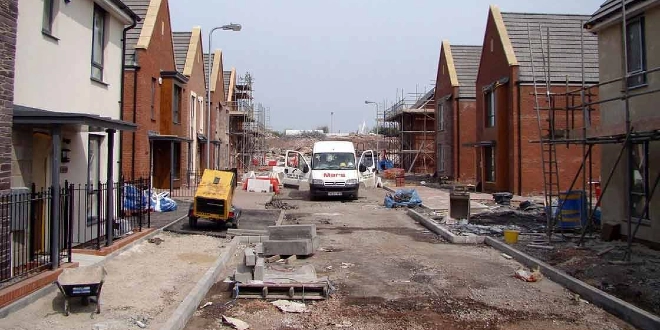The Irish Government has come under fire from opposition parties over its housing policies, with accusations of misleading data and concerns about potential tax incentives for developers. The controversy emerged following Minister for Public Expenditure Jack Chambers’ claim that 60,000 housing commencements in 2024 would lead to a rise in completed homes, a figure that has been strongly disputed.
Opposition Criticizes Government’s Housing Figures
During Leaders’ Questions in the Dáil, Social Democrats deputy leader Cian O’Callaghan accused the Government of relying on inaccurate data regarding housing starts, arguing that many of the sites remain idle and will not result in actual housing completions. He cited Property Investment Ireland, a developers’ lobby group, which echoed concerns that the commencements would not translate into built homes.
At the same time, the Cabinet approved a Government motion emphasizing the need to diversify housing investment sources, signaling a shift toward greater private sector involvement.
Chambers defended the Government’s strategy, pointing to a strong pipeline of projects, assisted by the development levy and water waivers, which he argued would contribute to higher housing completions in 2024 and 2025. He also stated that all policy options, including tax breaks for developers, were under review.
Labour Party Warns of Policy Mistakes
Labour leader Ivana Bacik accused the Government of repeating past mistakes in housing policy. She criticized its potential plans to weaken renter protections and provide financial incentives to developers, arguing that research from the Economic and Social Research Institute (ESRI) has already shown that tax breaks for investment funds do not increase housing supply.
Bacik announced that Labour would unveil its own housing plan, emphasizing evidence-based policies to address what she called a “housing catastrophe.”
She further accused Fianna Fáil and Fine Gael of misleading the public during the general election, suggesting they withheld information about potential renter protections being removed and were preparing to hand out benefits to developers without public scrutiny.
Government Defends Strategy, Calls for Private Sector Role
Responding to criticism, Jack Chambers emphasized that if Ireland is to achieve 50,000 housing completions annually, there must be greater involvement from the private sector. He urged opposition parties to acknowledge this reality, adding that the Government is open to exploring all options to increase housing supply.
Dismissing Labour’s proposal to establish a State construction company, Chambers argued that such an initiative would take years to become viable, whereas the current focus should be on unlocking all available resources to enhance affordability and supply.
He acknowledged that only 30,000 homes were completed in 2024, but insisted that over the past three years, Government targets had exceeded expectations by more than 5,000 units.
Debate Over Tax Incentives for Developers
Minister of State for Finance Robert Troy stressed the importance of attracting additional funding to complement the Government’s investment in housing.
Speaking on RTÉ’s Drivetime, Troy argued that if tax incentives have historically encouraged housing supply, they should be reconsidered as part of the solution. However, he clarified that no final decision has been made.
Troy attributed high rental prices to demand outpacing supply, warning that the Government alone cannot invest the €20 billion needed annually to build 50,000 homes.
Strong Opposition from Left-Wing Parties
Solidarity-People Before Profit TD Ruth Coppinger strongly criticized the Government’s consideration of tax breaks, branding it as a “Thatcherite” policy designed to benefit private developers at the expense of tenants.
Coppinger claimed the Government had finally revealed its true intentions, arguing that its housing strategy prioritizes profit-driven development rather than ensuring housing affordability.
Her views were echoed by party colleague Richard Boyd Barrett, who asserted that developers and investors seek to drive up housing prices for their own financial gain, rather than genuinely addressing the crisis.
Concerns Over Rent Pressure Zones and Renter Protections
The debate over rent protections also intensified, particularly regarding Rent Pressure Zones (RPZs), which cap annual rent increases at 2%.
Sinn Féin’s Eoin Ó Broin highlighted the case of a 70-year-old woman with a special needs daughter, who fears she will become homeless if RPZs are weakened. She currently pays €1,477 per month in rent, and credits RPZ protections with keeping her housing affordable.
Ó Broin accused the Government of breaking election promises to renters, warning that it is on track to dismantle protections despite worsening conditions for tenants.
In response, Chambers reiterated that the Government’s priority is increasing housing supply, adding that a review of RPZs is ongoing and will be assessed before a final decision is made.
Labour Warns of Fallout if RPZs Are Removed
Labour housing spokesperson Conor Sheehan issued a stark warning, stating that if the Government removes RPZ protections, the rental sector will descend into chaos.
He pointed out that the average rent in Limerick is now €2,100, cautioning that without controls, prices will rise further. Sheehan called for a three-year rent freeze, arguing that this would provide stability for renters during the ongoing housing crisis.
His concerns were shared by Labour finance spokesperson Ged Nash, who expressed disbelief over the potential for tax breaks for property investors, comparing it to failed housing policies of the early 2000s.
Future of Housing Policy Remains Contentious
On Sunday, Taoiseach Leo Varadkar confirmed that the Government is reviewing the RPZ system, which is set to expire at the end of the year.
While no final decisions have been made, the debate over housing policy is set to intensify, with opposition parties pushing for renter protections, while the Government argues for greater private sector involvement to boost housing supply.
 The Daily Star Ireland
The Daily Star Ireland

